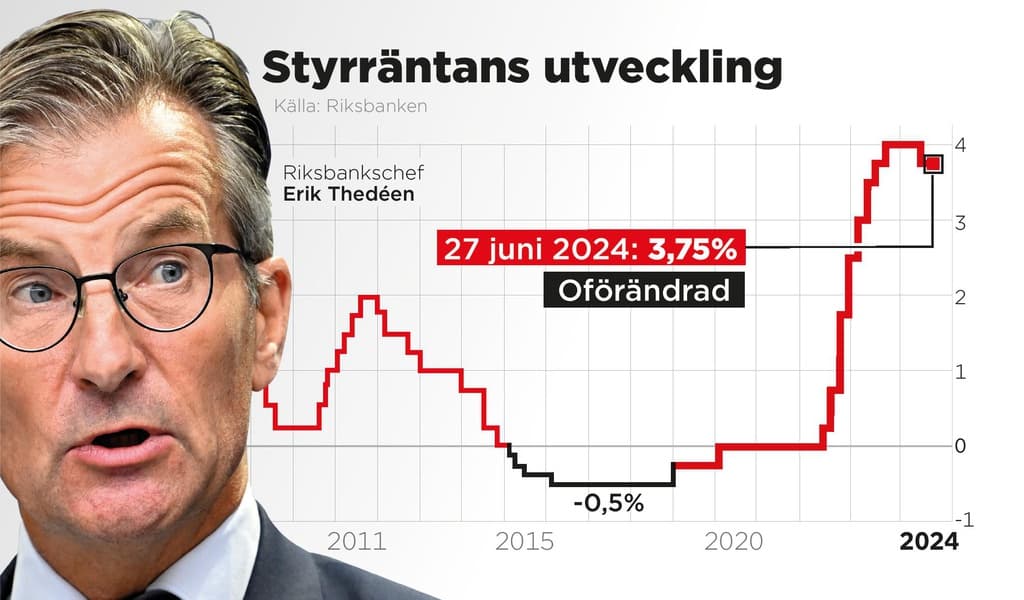The Riksbank expects to be able to make two or three interest rate cuts during the second half of the year, if inflation falls as expected.
We are in a new phase of monetary policy, says Riksbank Governor Erik Thedéen.
The krona fell slightly against both the dollar and the euro, and Swedish market interest rates were pushed down, following the surprising announcement of three possible interest rate cuts this year.
We see conditions to ease monetary policy during the second half of the year, says Thedéen at a press conference.
The decision to keep the repo rate at 3.75 per cent was expected. However, at the same time, the Riksbank's board is lowering its interest rate path, i.e., its forecast for the repo rate going forward. It is now leaning towards two or three interest rate cuts – of 0.25 percentage points each – in the autumn.
Unexpectedly clear
This was an unexpectedly clear signal. Previously, the message was that they expected two interest rate cuts this year.
But it's a forecast. It's not a promise, says Thedéen.
Earlier in the week, Finance Minister Elisabeth Svantesson and Prime Minister Ulf Kristersson wrote in a joint opinion piece in Expressen that "The battle against inflation is now won".
The Riksbank Governor does not see the government's comment as a reason to let up now.
We do not relate our monetary policy to statements from the Prime Minister and the Finance Minister. We note that the inflation trend is going in the right direction, that inflation is, and will be, close to our target if our forecasts come true, and say that we will adjust gradually, says Thedéen.
A stronger krona, a weak Swedish economy, more cautious price plans among companies, and signs of weakness in the labour market are pointed out as factors that played a role in the decision to lower the interest rate path to two or three interest rate cuts in the autumn.
High confidence
Expectations close to the inflation target are another important factor, as it shows that companies and households, despite the inflation and interest rate shocks of 2022–2023, have high confidence in the Riksbank's inflation target of 2 per cent.
Thedéen believes that many households can now – in addition to lower interest rates – count on real wage increases as inflation falls below the wage growth rate.
But the journey to an inflation rate of 2 per cent is not straightforward, he says, pointing to other countries that have experienced setbacks in their fight against inflation.
He adds that monetary policy going forward will be adjusted to incoming and new information.
The Riksbank expects a KPIF inflation rate of 2.0 per cent this year and 1.8 per cent in 2025. The previous inflation forecast was 2.3 per cent and 1.9 per cent for the two years, respectively. The Riksbank is also lowering its inflation forecast for 2026, down to 1.9 per cent, from 2.0 per cent previously.
The Riksbank's inflation target is a KPIF inflation rate of 2 per cent.
The growth forecast for this year is simultaneously being raised significantly to 1.1 per cent, up from the previous estimate of 0.3 per cent. The growth rate for next year is estimated at 1.7 per cent, which can be compared to 1.9 per cent in the previous forecast.
The Riksbank highlights that inflation and economic outlooks are uncertain.
The Riksbank's repo rate sets the tone for the interest rate environment in the Swedish economy, among other things by affecting households' variable mortgage interest rates and the interest rates companies pay for their financing.
If mortgage interest rates were to follow the repo rate down by 0.75 percentage points, it would reduce the interest cost for a mortgage of three million kronor by 22,500 kronor per year or 1,875 kronor per month, if one disregards the effects of interest deductions.






